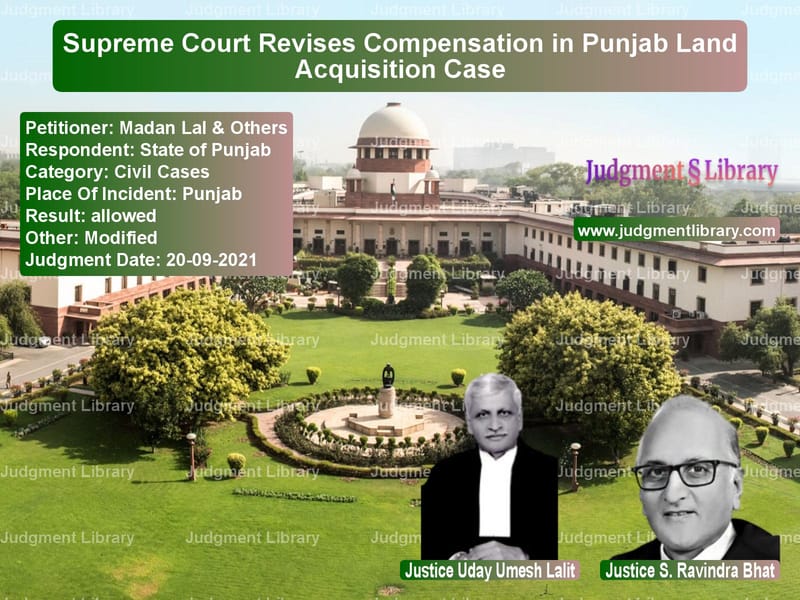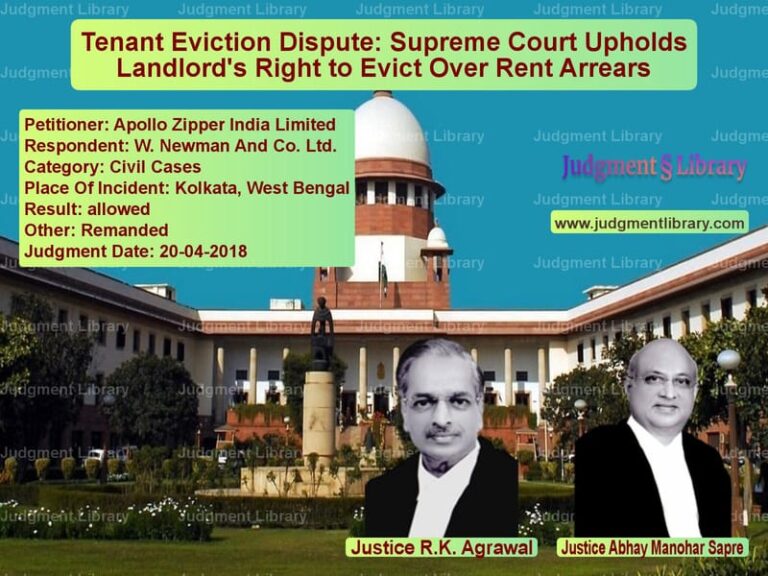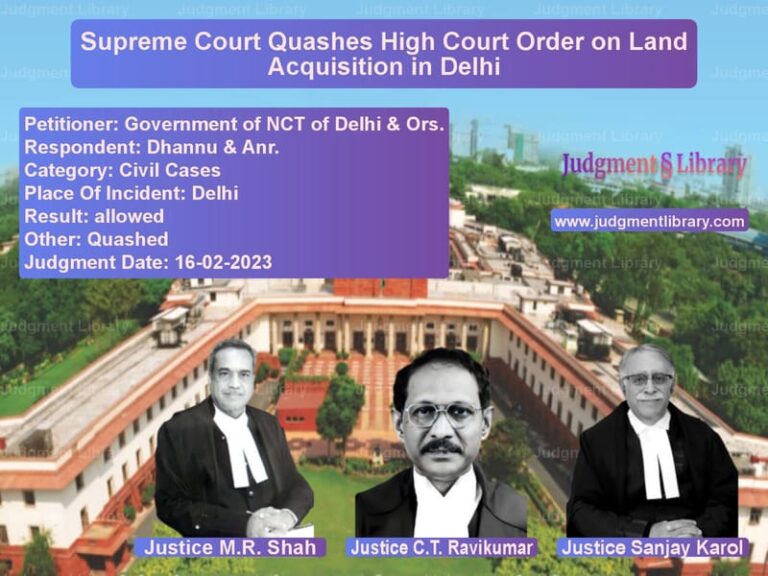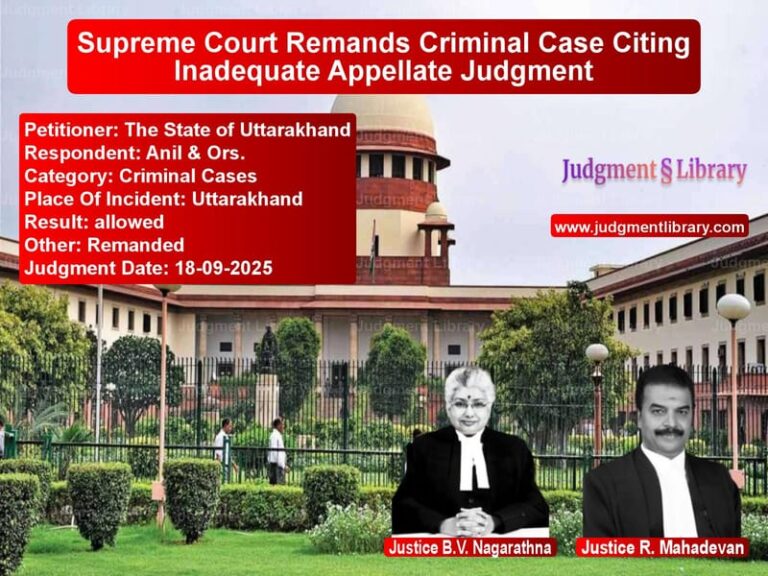Supreme Court Revises Compensation in Punjab Land Acquisition Case
The Supreme Court of India recently ruled on an important land acquisition dispute involving the State of Punjab and landowners led by Madan Lal. The case revolved around compensation awarded for land acquired under the Land Acquisition Act, 1894, and whether deductions due to the ‘shadow of terrorism’ were justified. The judgment sets a precedent in compensation calculations for landowners in regions affected by historical socio-political conditions.
Background of the Case
The dispute originated from land acquisition proceedings initiated through a notification under Section 4 of the Land Acquisition Act, 1894, issued on December 15, 1988. The acquired land’s valuation was determined based on a method that factored in market appreciation over time. The Punjab and Haryana High Court fixed the base value of the land at Rs.92.56 per square yard, applying a yearly appreciation rate of 7.5%.
However, the High Court further subjected this value to a 50% cut, considering two deductions:
- 25% for development-related adjustments.
- 25% due to the impact of terrorism in Punjab during that period, which was believed to have depressed land prices.
The landowners, led by Madan Lal, appealed against the second deduction, arguing that the valuation process should not have considered socio-political conditions as a factor for compensation reduction.
Arguments Presented
Appellant’s Arguments (Madan Lal & Others)
- The landowners challenged the 25% deduction applied due to terrorism, arguing that such considerations were arbitrary and not based on real market transactions.
- They contended that landowners should be compensated based on actual market trends, and socio-political factors should not be arbitrarily used to diminish compensation.
- The Punjab and Haryana High Court erred in making this additional deduction as there was no direct evidence to suggest that land transactions in the region were significantly undervalued due to terrorism.
Respondent’s Arguments (State of Punjab)
- The State of Punjab defended the deduction, arguing that terrorism in the late 1980s had negatively impacted economic activities, including land transactions.
- The State asserted that the court was justified in considering historical conditions while determining land value, as transactions during that period reflected an artificially lower market price.
- It was also argued that applying a further cut was necessary to ensure fair compensation without overestimating land values.
Supreme Court’s Analysis and Judgment
On the Justification of the Deduction Due to Terrorism
“The High Court was not, therefore, justified in subjecting the base value for a further cut on account of the State being under shadow of terrorism during the relevant time.”
The Supreme Court rejected the argument that the impact of terrorism should be a basis for reducing compensation. The Court emphasized that market valuations must be based on concrete factors such as actual sales transactions and appreciation trends, rather than assumptions about socio-political conditions.
On the Final Compensation Calculation
“Resultantly, the value of Rs.92.56 per square yard will be subject only to 25 percent cut by way of development. The net value, therefore, will be Rs.69.42 per square yard.”
The Supreme Court ruled that only the 25% development cut should apply, removing the additional deduction related to terrorism. The revised compensation was fixed at Rs.69.42 per square yard.
Final Judgment
The Supreme Court set aside the Punjab and Haryana High Court’s deduction related to terrorism and directed the State to compensate landowners based on the revised calculation:
“The difference in computation shall be made over to the concerned appellants by the State within eight weeks from today.”
Implications of the Judgment
- Fair Land Compensation: The ruling ensures that landowners are compensated based on actual market appreciation without arbitrary socio-political deductions.
- Legal Precedent: Courts must rely on concrete market trends rather than assumptions about external conditions when determining compensation.
- Increased Landowner Protections: The judgment prevents the use of external socio-political factors as a justification for lowering compensation.
- Government Liability: The ruling emphasizes the responsibility of state authorities to provide compensation in a fair and timely manner.
Conclusion
The Supreme Court’s decision in this case strengthens legal protections for landowners in acquisition proceedings. By rejecting arbitrary deductions based on socio-political conditions, the judgment reinforces the principle that land valuation must be based on transparent and quantifiable market data. The ruling ensures that landowners receive fair compensation, setting a crucial precedent for future land acquisition cases in India.
Read also: https://judgmentlibrary.com/supreme-court-criticizes-repeated-adjournments-in-civil-litigation/
Petitioner Name: Madan Lal & Others.Respondent Name: State of Punjab.Judgment By: Justice Uday Umesh Lalit, Justice S. Ravindra Bhat.Place Of Incident: Punjab.Judgment Date: 20-09-2021.
Don’t miss out on the full details! Download the complete judgment in PDF format below and gain valuable insights instantly!
Download Judgment: madan-lal-&-others-vs-state-of-punjab-supreme-court-of-india-judgment-dated-20-09-2021.pdf
Directly Download Judgment: Directly download this Judgment
See all petitions in Property Disputes
See all petitions in Damages and Compensation
See all petitions in Judgment by Uday Umesh Lalit
See all petitions in Judgment by S Ravindra Bhat
See all petitions in allowed
See all petitions in Modified
See all petitions in supreme court of India judgments September 2021
See all petitions in 2021 judgments
See all posts in Civil Cases Category
See all allowed petitions in Civil Cases Category
See all Dismissed petitions in Civil Cases Category
See all partially allowed petitions in Civil Cases Category







